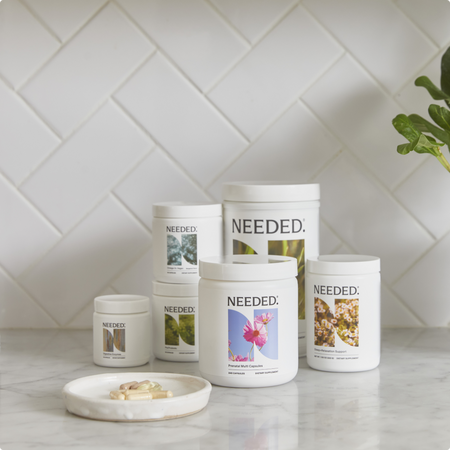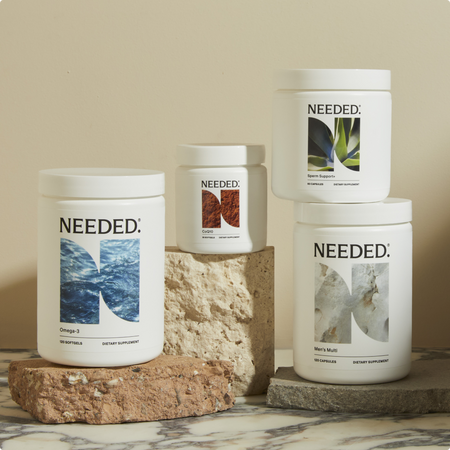How Much Water Should I Drink While Pregnant?
Growing a human is thirsty work, so understanding how much water you should drink while pregnant is essential for your health and your baby's development. The recommended daily water intake during pregnancy is about 8-12 cups (64 to 96 ounces). However, your specific needs may vary depending on your body, activity level, and environmental factors such as average temperature and altitude.
Prioritizing pregnancy hydration helps with digestion, nutrient delivery, and reduces the risk of dehydration that can affect both you and your baby.
Why Is Hydration So Important During Pregnancy?
Yes, we should all drink more water, but during pregnancy, it’s especially critical to stay hydrated. Below are some of the benefits of drinking water while pregnant:
- Increased Blood Volume: Your body produces more blood to support the placenta and baby. More fluids help maintain this extra volume.
- Amniotic Fluid Production: Water plays a crucial role in creating and maintaining amniotic fluid, which serves as a cushion and protection for the baby.
- Nutrient Transport: Fluids help transport essential nutrients through your bloodstream to your baby.
- Digestive Support: Drinking water can help prevent common pregnancy issues like constipation and bloating.
- Body Temperature Regulation: Staying hydrated helps regulate your body temperature, especially important as pregnancy raises your metabolic rate
How Much Water Do You Need in Each Trimester?
Water needs by trimester can shift as your body changes. Here’s what to expect for pregnancy water intake by week and trimester.
First Trimester
More than two-thirds of women will experience morning sickness during the first trimester, which can increase their risk of dehydration. Sip small amounts of water throughout the day to stay hydrated and to help with nausea and vomiting.
Second Trimester
Did you know that during the second trimester, your blood volume will increase by about 45% to accommodate your growing baby? The increased volume delivers oxygen and nutrients, supports your growing uterus, and begins building a reserve of backup blood in case of blood loss during delivery.
So it’s essential to drink water and stay hydrated. Bonus: Constipation may increase during the second trimester; drinking water can help alleviate symptoms.
Third Trimester
During the final weeks of pregnancy, fluid retention and swelling in the legs and feet may become an issue, and dehydration can make it worse. Adequate hydration helps with fatigue, swelling and prepares your body for labor by supporting endurance.
What Counts Towards Your Daily Fluid Intake?
You should prioritize water, but you can achieve your hydration goals in several ways. Just ensure you’re not consuming too much sugar or salt. Here are some other pregnancy-safe hydration options:
- Decaf Herbal teas: Flavors like peppermint and lemon can be soothing and hydrating.
- Milk: For adding calcium and protein.
- Fruit-infused water: Adds flavor without added sugars.
- Soups and smoothies: Hydrate while providing nutrients (try this delicious creamy roasted potato soup for a hearty treat!).
- Fruits and vegetables: Many contain high water content.
Best Foods For Hydration
|
Food |
Water Content (%) |
Additional Benefits |
|
Cucumber |
96% |
Low-calorie, refreshing |
|
Watermelon |
92% |
Hydrating, contains vitamins A & C |
|
Strawberries |
91% |
High in vitamin C |
|
Lettuce |
95% |
Light and crunchy hydration |
|
Celery |
95% |
Good source of fiber |
|
Zucchini |
94% |
Versatile in meals |
Signs You May Not Be Drinking Enough Water
If left for too long, dehydration during pregnancy can have severe side effects, so watch for these signs that you aren’t drinking enough water:
- Dark yellow urine
- Headaches
- Dry mouth
- Dizziness
- Constipation
- Low amniotic fluid (in severe cases)
These pregnancy and dehydration symptoms indicate that it's time to step up your fluid intake.
Simple Pregnancy Hydration Tips
You don’t have to chug water to stay adequately hydrated. Below are a few simple tips to make fluid intake part of your daily routine:
- Carry a refillable water bottle to sip throughout the day.
- Flavor water naturally with slices of lemon, cucumber, or mint, or treat yourself to a fancy mocktail to really elevate the experience.
- Set hourly reminders or use hydration apps to track your intake.
- Drink a glass of water with every meal or snack to establish a routine.
- Opt for hydrating snacks like cucumber, watermelon, or strawberries
Frequently Asked Questions About Pregnancy Hydration
Can I drink too much water during pregnancy?
Yes, but it's uncommon. Overhydration can dilute important electrolytes. Stick to the recommended 8-12 cups unless advised otherwise.
What if I feel sick when I drink water while pregnant?
If water triggers nausea, try sipping slowly, using a straw, or opting for cold or flavored water. Herbal teas or diluted juices can help too.
Do hydration needs change if I’m exercising or it’s hot outside?
Yes. Increase your water intake when active or in hot weather to replace fluids lost through sweat.
Can dehydration trigger contractions?
Yes, dehydration can lead to Braxton Hicks or even preterm contractions. Staying hydrated helps prevent this risk.
Should I drink more water before labor?
Yes. Proper hydration before and during labor supports endurance, energy, and helps avoid complications.
Final Thoughts: Keeping You and Baby Hydrated
Hydration during pregnancy doesn’t have to be complicated, but it is essential. Small, consistent habits make a big difference for your health and your baby’s development. When in doubt about your hydration needs, always consult your healthcare provider.















